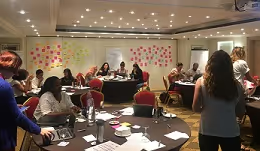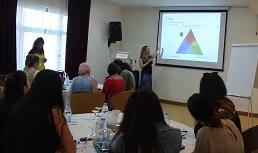SenseMaker® for Monitoring and Evaluation of SGBV Programs

Project overview
Evidence on the impact of Sexual and Gender-Based Violence (SGBV) programming is lacking. To address this, we will examine the feasibility of an innovative monitoring and evaluation (M&E) tool, Cognitive Edge’s SenseMaker®, to generate timely mixed methods data about SGBV programs.
Countries
Lebanon
Organisations
Queens University
Partners
ABAAD Resource Centre for Gender Equality; UNFPA, Lebanon; International Rescue Committee (IRC), Lebanon
Area of funding
Humanitarian Innovation
Grant amount
£49,958
Start date
09
January
2017
End date
09
April
2018
Project length (in months)
15.2
Project solution
This project offers [specific solution or intervention] to tackle [challenge]. By implementing [strategies, tools, or innovations], the project aims to achieve [desired outcomes]. The approach is designed to [specific actions or methods] to bring about meaningful change in [community, region, or issue area].
Expected outcomes
This project aims to achieve [specific outcomes], such as [measurable results, improvements, or changes]. The expected impact includes [benefits to the target community, advancements in research or innovation, or long-term effects]. By the end of the project, we anticipate [specific changes or milestones] that will contribute to [broader goals or objectives].
No items found.
What is the humaniarian need?
M&;E for SGBV programming frequently relies on output measures such as number of beneficiaries receiving services. Evidence on the outcomes and impacts of those services is currently lacking. Theory-of-change models often rely on theoretical assumptions that individuals benefit from receiving services but in practice, there is little evidence to support these assumptions. Quality M&;E data on SGBV services is needed for responsive programmatic decision-making and more efficient methods of data collection are required, particularly in complex settings such as humanitarian crises.
What is the innovative solution?
As an innovative M&;E tool, SenseMaker® will ask individuals to share stories about their experiences with SGBV services. Because the questions are open-ended, individuals can report positive or negative aspects and since it is narrative-based, it tends to elicit more revealing responses. Because participants interpret their own stories using pre-defined questions, interpretation bias is reduced and the accompanying narratives help to contextualise the quantitative responses. Furthermore, because the SenseMaker® data collection is digital, results are promptly available.
SenseMaker® will allow continuous collection of anonymous, self-interpreted stories about the way people experience SGBV services. The mixed-methods data will enable new insights to inform adaptive delivery of SGBV services with decision-making that is based on what is perceived to be happening rather than working towards aspirational outcomes. If this innovation proves to be feasible, valuable and scalable, it may provide an effective way to shape evolutionary change for M&;E in humanitarian crises.
What are the expected outcomes?
We will test the feasibility of using SenseMaker® for M&;E of SGBV programming with the following anticipated outcomes:
- Prototype for a SenseMaker® SGBV M&;E tool developed collaboratively by the team and piloted for a period of three months.
- Monthly mixed-methods program evaluation data to help adapt and improve existing SGBV services to better meet beneficiaries’ needs, identify gaps in programming, and recognize potential harms.
- Formative data for and deliberative dialogue around a SGBV –specific rapid needs assessment for use in humanitarian settings.
- Project report on the SenseMaker® SGBV M&;E tool reflecting on lessons learned and concrete examples of how SenseMaker® data can inform SGBV programming and services.

No items found.
Project delivery & updates
Stay up to date with the latest developments from this project. Here, you will find details on what has been delivered, resources created, and regular updates as the project progresses. Access key documents, reports, and other materials to see how the project is making an impact.
No resources/updates have been published yet for this project. Sign up for our newsletter to stay informed about upcoming publications and updates!
Join our Newsletter



